Navigating Japan’s TEFL Scene: The 6 Biggest Conversation Schools
Table of Contents
- The Biggest Eikaiwa Chains in Japan
- 1. AEON
- 2. Berlitz Japan
- 3. ECC
- 4. GABA 1:1 English Language School
- 5. NOVA
- 6. Shane English School
- Experiences and insights from TTA alumni
Didn’t land a JET spot? No stress—you can still be an English teacher in Japan. With countless opportunities for immersion and endless bowls of ramen at your fingertips, why wouldn’t you consider teaching jobs in Japan? In your quest to find the best ESL gig, you’ll come across eikaiwa schools.
The eikaiwa is an excellent option with a huge incentive: big city living! Eikaiwas are mostly located in major cities like Tokyo, unlike ALT (Assistant Language Teacher) roles in public schools, which are usually found in smaller towns.
Eikaiwas hire throughout the year, increasing your chances of finding a teaching position in Japan. All you need is a fluent command of English to get your foot in the door.
The question is, which eikaiwa should you choose to work for?
What are your options? Let’s take a look at some of the biggest eikaiwa chains in Japan and what they offer.
1. AEON
Aeon is considered one of Japan’s best eikaiwas. It has 250+ schools across all 47 prefectures (i.e. provinces), 40,000+ students enrolled, and a teaching staff of 350+ native English speakers.
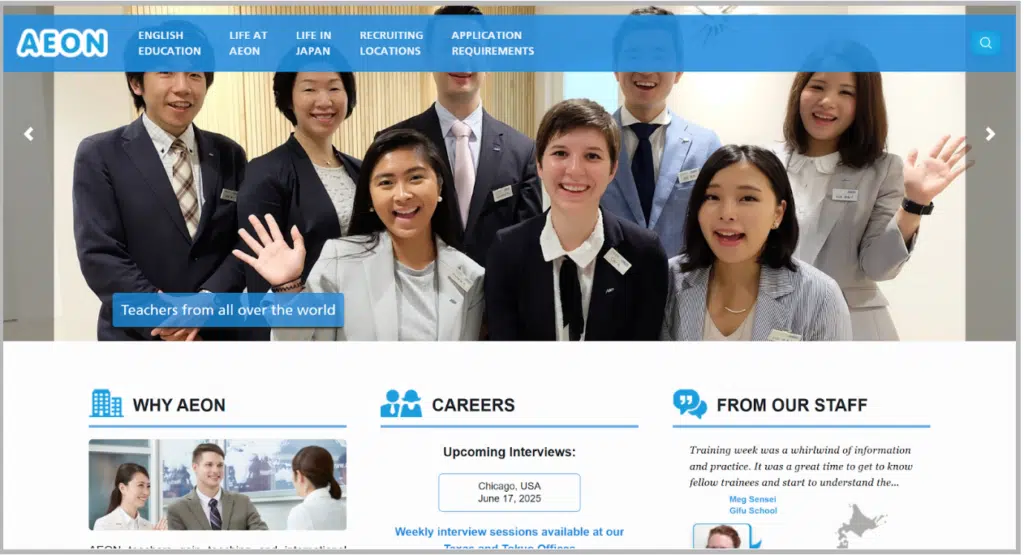
What are the requirements?
Teachers must be eligible for a Certificate of Eligibility or have the right to work in Japan. Teachers must be proficient in English and be interested in Japanese culture and way of life. Teaching experience and Japanese skills are preferable but not a requirement.
What is the hiring process?
AEON hires monthly throughout the year. They make the process easy by hosting regular interviews in Texas, Tokyo and select locations abroad.
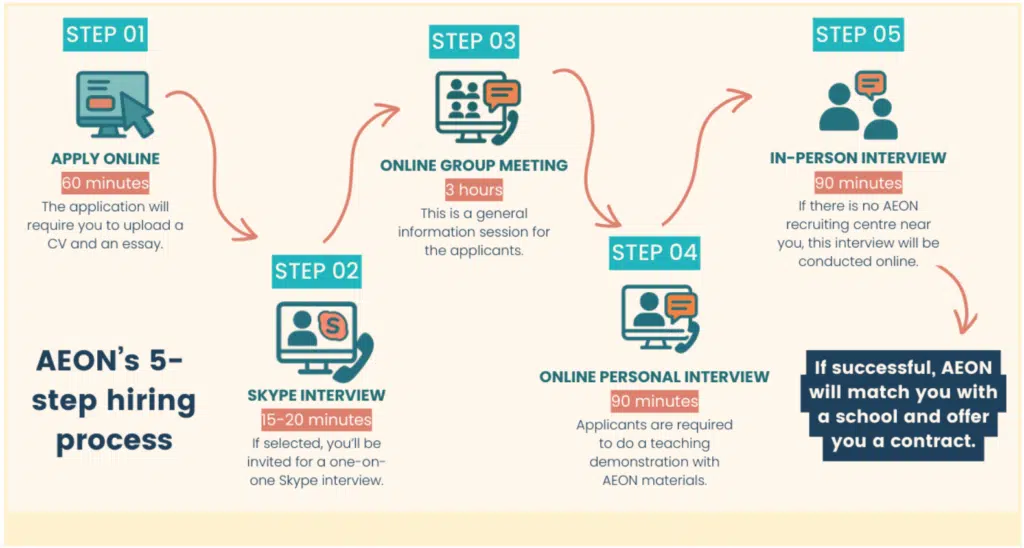
What salary & benefits can I expect?
The monthly salary is fixed at ¥275,000 ($1,841), with a base salary of ¥255,000 ($1,707) and a fixed overtime allowance of ¥20,000 ($133). It’s possible that other allowances and extras can be added if additional work is carried out. Teachers work 40 hours a week, typically Tuesday to Sunday, 10am to 9pm, with a contract length of 1 year (renewable).
READ MORE: How much can you earn in Japan?
There are opportunities for growth within the company after some time. High-performing teachers may branch out into various other positions, such as:
- Emergency teaching
- Corporate division
- Training
- Curriculum development
- Recruiting
Benefits:
- Pre-departure training
- Paid training and professional development
- Paid commuting expenses
- Fully-furnished subsidised housing (¥55,000/month)
- Visa sponsorship
- Health insurance and pension
- One-time flight allowance of ¥70,000 (if arriving from outside Japan)
- 3x one-week vacations, 5 extra personal days, all Japanese national holidays
- One-time contract completion bonus (¥80,000 – ¥160,000)
- Complete TEFL certification on the job at a discounted rate
Work culture
Technology is utilised in AEON schools, so you need to know your way around an iPad. Teachers are expected to be flexible, taking on roles like friend and educational counsellor, with cultural exchange a key part of the English immersion experience for students.
2. Berlitz Japan
Berlitz is a well-known international chain school, famous for its teaching method: the Berlitz Method. It has 44 branches (as of 2023) in 30+ locations across Japan, with 1,200 teachers and 4,800 Japanese corporate clients.
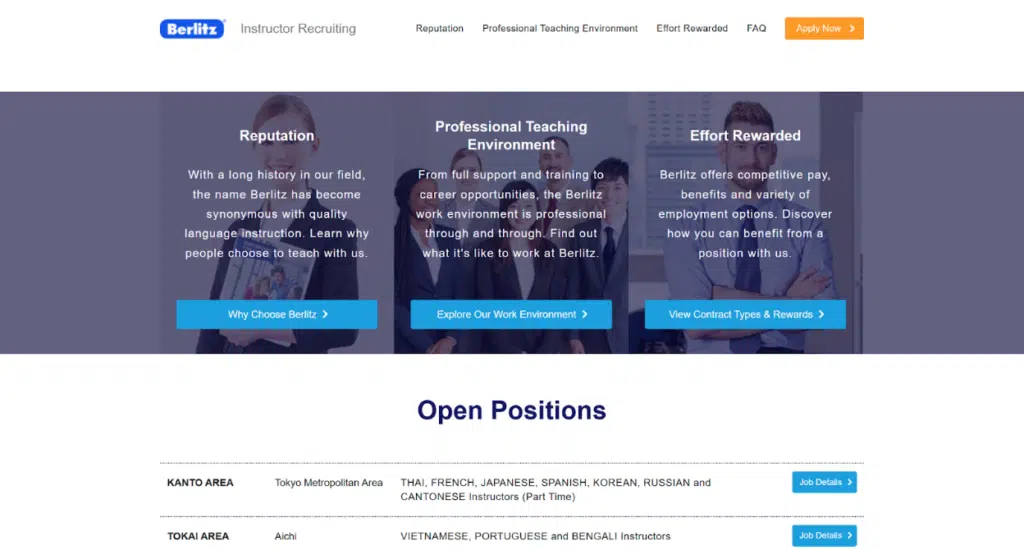
What are the requirements?
Teachers must be eligible for a COE and have fluency in English.
What is the hiring process?
There are two hiring procedures: domestic and overseas. Both have six steps.
- Online application
- Detailed questionnaire about the applicant
- In-person group interview (domestic) or online interview (overseas) with Human Resources
- Individual interview (online or in-person for overseas candidates) with a supervisor
- Instructor Qualification Program (IQP) – applicants must complete this training program
- Employment
What salary & benefits can I expect?
Teachers are paid a salary of ¥281,875 ($1,887) a month for a full-time contract, or ¥1,990 a lesson for a part-time contract. The contract is 1-year renewable. It’s also possible to work on a per-lesson contract at a rate of ¥2,040 a lesson, but lessons are not guaranteed.
Work hours vary depending on your chosen contract.
- Full-Time Instructor: 38 hrs a week
- Part-time Plus Contract: 26.6 hrs a week
- Part-Time Guaranteed: 13.5 hrs a week
- Per-Lesson Contract: individualised schedule
Rewards are offered to top-performing instructors, ranging from annual salary and per-lesson rate increases to paid sick days and remuneration for travel costs.
Benefits:
- Training and professional development
- Small group or 1:1 classes
- Health insurance
- Visa sponsorship
- Paid sick/personal days
- Special Paid Absence after 1 year
- Monthly public transportation pass
- Opportunities to teach extra lessons and earn more
- ±15 days a year, company holidays, Christmas Day
Before teachers start working, they complete the Instructor Qualification Program, which ensures they uphold Berlitz’s longstanding reputation. Training is done in two parts:
- Teaching at Berlitz Program (online): 5 self-study modules
- A 2-day in-person training session
Ongoing training takes place through ad-hoc sessions throughout the term of employment.
Work culture
Berlitz Japan expects instructors to maintain a professional appearance, as many students are business professionals. Collaboration is key as counsellors brief instructors on client needs and act as middlemen to keep instructors informed.
Smaller classes allow for tailored, student-centred instruction. Berlitz focuses on real-world language applications and integrates tech in classrooms for both students and teachers.
Instructors can branch out into various roles such as:
- Mentor
- Kids’ Coordinator
- Berlitz Talent Growth Trainer
- Customer Experience Director
- Other departmental management roles
When you’re not teaching, you may find yourself writing reports, helping with events, customising curricula, scheduling, or doing various administrative tasks.
3. ECC
ECC stands for Education through Communication for the Community. It has 400+ native English-speaking teachers at 188 locations countrywide.
What are the requirements?
Teachers must be eligible for a COE or have the right to work in Japan, and be a native speaker of English. No TEFL certifications or teaching experience are required. You need ¥200,000 ($1,339) for relocation costs. Teachers must be able to commit to a 12-month contract.
What is the hiring process?
The hiring process takes approximately 4 to 5 months from application to start date.
How to apply:
- Apply on the website
- Attend a 1-day recruitment session in Australia, Canada, the US, the UK or Japan.
- An employment offer will follow if you are successful.
What salary & benefits can I expect?
Teachers are paid a monthly salary of ¥270,000 ($1,808). Contracts are 1-year renewable. Teachers work a 5-day, 35-hour work week.
Benefits include:
- ¥70,000 travel stipend for new recruits
- Work commute reimbursement
- Initial 2-week teacher training
- Visa sponsorship
- Performance-based stipends
- ±15 leave days a year, company holidays, Christmas Day
- Free annual medical check
- Social, healthcare and pension benefits
Work culture
Teaching materials are provided, but taking initiative and adapting lessons to your teaching style is preferred.
4. GABA 1:1 English Language School
Gaba specialises in one-on-one lessons. According to its website, it has 36 schools with 16,000 clients, though this information may be outdated. There are GABA schools in 3 locations: Kanto, Kansai, and Chubu.
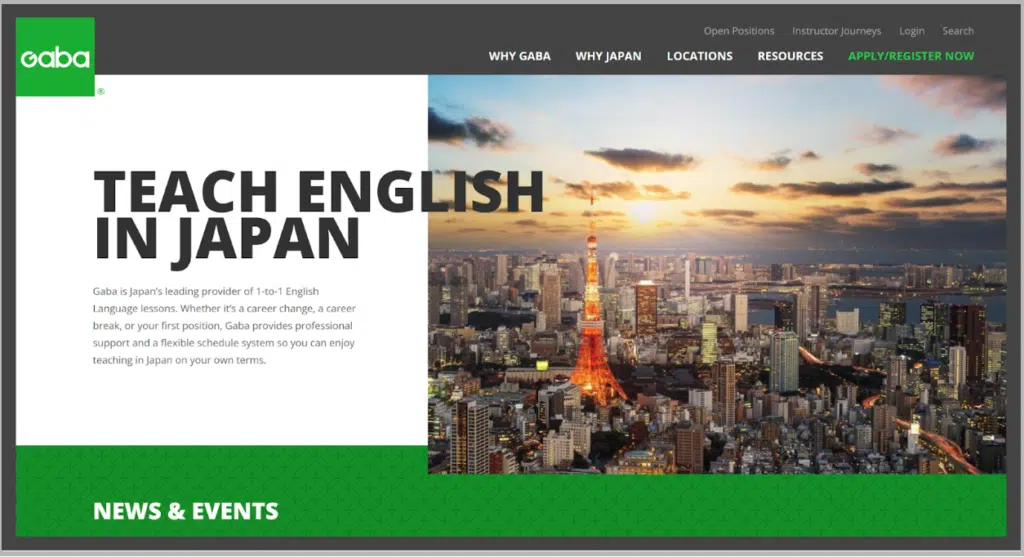
What are the requirements?
Teachers must be eligible for a COE or have the right to work in Japan, be fluent in English and computer-literate. Teachers must commit to a six-month full-time contract and be able to attend a three-day Initial Certification.
A TEFL qualification and prior teaching experience are preferred but not essential.
What is the hiring process?
How to apply:
- Browse the open jobs on the website
- Fill in the job-specific application form online
- Telephonic interview
- Online interview
- Sign contract
- Initial certification (3 days)
- On-the-job certification (3 hours)
What salary & benefits can I expect?
There is no set monthly salary. Teachers are hired as independent contractors (known as a gyomu itaku). You choose when, where and how much you want to work. Gaba has as many as 18 lesson rates and utilises its Belt System to recognise and reward hard workers. The initial base rate is ¥1,630 ($11) per lesson.
If you’re particularly ambitious, you can aim to be a top performer by teaching over 200 lessons a month. Contracts are for 6 months, but new teachers must commit to 1 year.
Teachers can explore various career opportunities such as leading sales lessons, creating podcasts, having corporate sessions or developing teaching materials.
Benefits:
- 1:1 classes
- In-house certification available through Gaba partners at select overseas locations
- Comprehensive training programs
- Opportunity to diversify your skills through specialised certifications
- Unique flexible contract
- Incentives for top performers
- Visa sponsorship
Work culture
Gaba fosters a professional work environment with motivated adult students and a flexible schedule. A dark business suit is a must when teaching at Gaba.
Students book lessons via an online booking system. Instructors have flexibility in choosing their monthly schedules. Support leaders and managers are the first point of contact for questions and concerns.
5. NOVA
NOVA provides flexible learning options (in-person, online, and video-conferencing lessons), as well as test preparation (TOEIC and TOEFL), specialised courses (e.g. business communication), travel English, and specialised programmes like Voice and NOVA Bilingual Kids. There are nearly 300 NOVA branches across Japan.
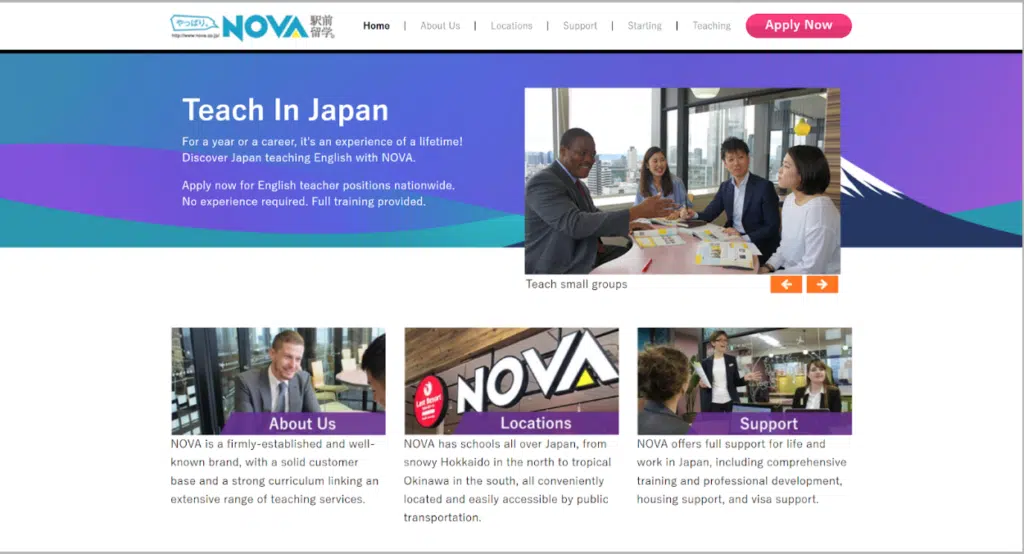
What are the requirements?
Teachers must be eligible for a COE or have the right to work in Japan. Teachers need a Bachelor’s degree, but no prior teaching experience is required.
What is the hiring process?
How to apply:
- Complete the online application form
- Interview
- Initial training
- On-the-job training
What salary & benefits can I expect?
Teachers are hired as independent contractors. Contracts can be for up to 40 lessons a week, depending on your visa. A typical schedule for 37 lessons includes four 8-lesson shifts (with meal breaks) and one 5-lesson shift. Shift times vary based on customer demand, with peak hours in the evenings and weekends.
Contracts are for 6 months or 1 year, renewable.
Benefits:
- Contract-signing bonus
- Semi-furnished housing
- Visa sponsorship
- ¥1,200 – ¥2,200 per 40-minute lesson during the 1st year
- Contract-completion bonus
- Tiered monetary rewards for top performers
- 4-Day comprehensive training
- Substitute teacher cover
- Incentives for teachers committing to 40 lessons per week:
- ¥100,000 flight allowance (¥50,000 within Asia)
- ¥30,000 Christmas bonus
Work culture
NOVA branches are open seven days a week. Classes typically run from 12:30pm to 9:30pm on weekdays and 9:00am to 6:00pm on weekends and national holidays. Larger schools have extended hours until 9:30 pm.
NOVA offers a competitive work environment where teachers receive tiered pay increases (bronze, silver, gold), based on client feedback. If you need a substitute teacher, NOVA provides one for ¥400 per lesson.
Unbooked lessons do not mean time off. You’ll still need to assist with admin tasks or greeting students.
6. Shane English School
Shane English School has been teaching English in Japan since 1977. It has ±500 native English-speaking teachers in 200+ schools in the Tokyo area, Kanagawa, Chiba, Saitama and Tokai Region, Kansai Region and Kyushu Region.
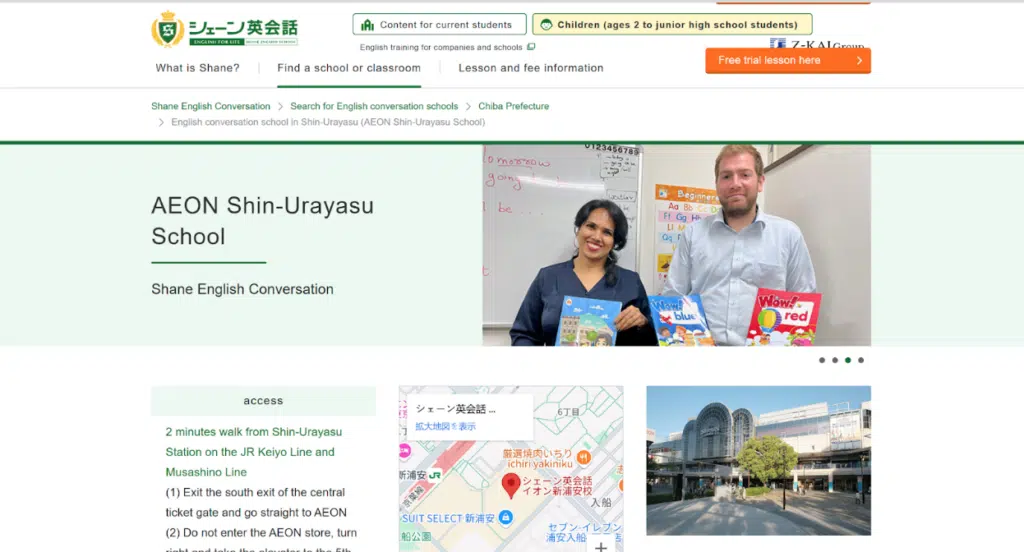
What are the requirements?
Shane only hires native English speakers from the UK, Canada, Australia, New Zealand and South Africa.
Teachers must be eligible for a COE or hold a valid working visa. Teachers must hold a Bachelor’s degree and have a TEFL certification of at least 60 hours + 3 months’ teaching experience.
What is the hiring process?
Check out their website for details of current vacancies.
What salary & benefits can I expect?
A full-time monthly salary is ¥247,800 – ¥252,800 ($1,660 – $1,693), while a part-time teacher earns ¥3,000 ($20) per contact teaching hour. Teachers work a 5-day work week, which can include weekends.
There is a range of contract types to choose from:
- Full-time
- Part-time (Language School)
- Part-time (Corporate Trainer)
Contracts are 6 months renewable (part-time) or 1-year renewable (full-time).
Benefits:
- Sponsored visa and work permit
- Extra paid annual leave days after completing 6 months
- No teaching experience is needed for those with a CELTA certification or TESOL certificate
- 1-week Young Learner-focused training
- Ongoing training
- Visa sponsorship
- Extra pay for additional lesson preparation
- Loan available for company housing
- Commuting costs reimbursed
- Healthcare provided
- 6 weeks’ paid annual leave (+5 days after 6 months)
Work culture
Shane English School offers a supportive working environment with Western management, making communication smoother and reducing potential misunderstandings for English teachers. This is useful for new hires who are still learning the ropes and acclimatising to Japanese culture.
Teachers are free to teach as they see fit. 50% of your lessons will be Young Learners. Business students make up the second half of your day.
Voices from the field: Experiences and insights from TTA alumni
TTA alumna Robyn taught for NOVA in 2019-2020 in Okayama.
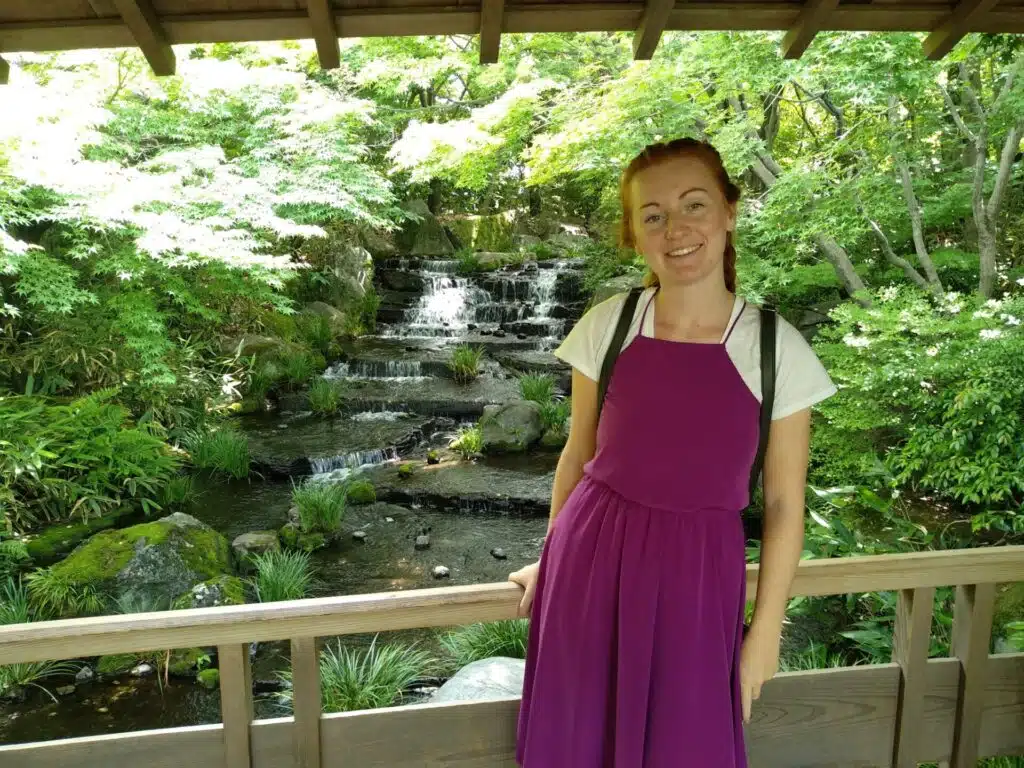
Known as the “Land of Sunshine,” Okayama was a city of peaches, rich history, and a slower, more affordable pace of life compared to Japan’s major urban hubs. Unlike in Tokyo or Osaka, foreigners were still a rare sight here, and English was not widely spoken. But this actually made for an incredibly warm and welcoming atmosphere—people were always excited to see or meet me, and I never once had a negative interaction as a foreigner.
I worked three days a week at the main branch in Okayama city and two days in the suburb of Kurashiki, just a 20-minute train ride away. The main branch was on the fifth floor of a central office building, with a bright open-plan lobby that doubled as a waiting area and reception. There were four small classrooms (think corporate office cubicles), a larger room for kids’ lessons, and a break space for teachers.
The classroom culture was surprisingly relaxed—you had control over how you conducted the lesson, as long as you followed the set textbook pages exactly as trained (very important!). Each session was 40 minutes long, with one to five students seated across from you at a table.
The students ranged from high school graduates to retirees, and depending on their level, lessons could be as simple as practicing “I like (shopping, traveling, sightseeing). What do you like?” or as advanced as tackling conditional sentences like “If I had studied harder, I would have passed the test.”
More often than not, students were enthusiastic and keen to learn, which made for a generally positive teaching experience. Since they were paying for the lessons (unlike in school, where students have no choice), there was a higher likelihood of motivated learners.
My ideal class? A one-on-one session with a confident student who was willing to chat beyond the textbook. My least favourite? Absolute beginner lessons, where we would repeat the same sentence structure endlessly—though even those could be fine if the student was engaged.
The kids’ lessons, on the other hand, were a completely different story. If adult classes were structured and straightforward, teaching five-year-olds who had never even spoken to a foreigner before was something else entirely. At least 20% of these lessons involved a crying child, and if it was a one-on-one session, I’d be left trying to comfort them while also attempting to teach them English. Luckily, the Japanese receptionists often stepped in to help.
Honestly, I’m not sure what was worse: the criers or the ones who wouldn’t sit still, running in circles while I tried to wrangle their attention. If you’ve ever heard people say that teaching English in Japan can feel like being a performing monkey, this was exactly when I felt like one!
Would I recommend working at an eikaiwa? Yes, absolutely. If you’re looking for an opportunity to live abroad, immerse yourself in a new culture, and gain valuable experience, this is one of the best and most secure ways to do it. It’s a very people-oriented job—you’ll interact with students and fellow teachers from all over the world daily. Plus, if you try it and realise it’s not for you, it’s easy to move on without regrets, knowing that you took the chance and learned something valuable from the experience.
Knowing the ins and outs of eikaiwa options is the secret to finding the right fit.
Once you’re ready to jump into the adventure of teaching English in Japan, level up with a TEFL qualification today and boost your chances of landing the perfect role.
Table of Contents
- The Biggest Eikaiwa Chains in Japan
- 1. AEON
- 2. Berlitz Japan
- 3. ECC
- 4. GABA 1:1 English Language School
- 5. NOVA
- 6. Shane English School
- Experiences and insights from TTA alumni
Didn’t land a JET spot? No stress—you can still be an English teacher in Japan. With countless opportunities for immersion and endless bowls of ramen at your fingertips, why wouldn’t you consider teaching jobs in Japan? In your quest to find the best ESL gig, you’ll come across eikaiwa schools.
The eikaiwa is an excellent option with a huge incentive: big city living! Eikaiwas are mostly located in major cities like Tokyo, unlike ALT (Assistant Language Teacher) roles in public schools, which are usually found in smaller towns.
Eikaiwas hire throughout the year, increasing your chances of finding a teaching position in Japan. All you need is a fluent command of English to get your foot in the door.
The question is, which eikaiwa should you choose to work for?
What are your options? Let’s take a look at some of the biggest eikaiwa chains in Japan and what they offer.
1. AEON
Aeon is considered one of Japan’s best eikaiwas. It has 250+ schools across all 47 prefectures (i.e. provinces), 40,000+ students enrolled, and a teaching staff of 350+ native English speakers.

What are the requirements?
Teachers must be eligible for a Certificate of Eligibility or have the right to work in Japan. Teachers must be proficient in English and be interested in Japanese culture and way of life. Teaching experience and Japanese skills are preferable but not a requirement.
What is the hiring process?
AEON hires monthly throughout the year. They make the process easy by hosting regular interviews in Texas, Tokyo and select locations abroad.

What salary & benefits can I expect?
The monthly salary is fixed at ¥275,000 ($1,841), with a base salary of ¥255,000 ($1,707) and a fixed overtime allowance of ¥20,000 ($133). It’s possible that other allowances and extras can be added if additional work is carried out. Teachers work 40 hours a week, typically Tuesday to Sunday, 10am to 9pm, with a contract length of 1 year (renewable).
READ MORE: How much can you earn in Japan?
There are opportunities for growth within the company after some time. High-performing teachers may branch out into various other positions, such as:
- Emergency teaching
- Corporate division
- Training
- Curriculum development
- Recruiting
Benefits:
- Pre-departure training
- Paid training and professional development
- Paid commuting expenses
- Fully-furnished subsidised housing (¥55,000/month)
- Visa sponsorship
- Health insurance and pension
- One-time flight allowance of ¥70,000 (if arriving from outside Japan)
- 3x one-week vacations, 5 extra personal days, all Japanese national holidays
- One-time contract completion bonus (¥80,000 – ¥160,000)
- Complete TEFL certification on the job at a discounted rate
Work culture
Technology is utilised in AEON schools, so you need to know your way around an iPad. Teachers are expected to be flexible, taking on roles like friend and educational counsellor, with cultural exchange a key part of the English immersion experience for students.
2. Berlitz Japan
Berlitz is a well-known international chain school, famous for its teaching method: the Berlitz Method. It has 44 branches (as of 2023) in 30+ locations across Japan, with 1,200 teachers and 4,800 Japanese corporate clients.

What are the requirements?
Teachers must be eligible for a COE and have fluency in English.
What is the hiring process?
There are two hiring procedures: domestic and overseas. Both have six steps.
- Online application
- Detailed questionnaire about the applicant
- In-person group interview (domestic) or online interview (overseas) with Human Resources
- Individual interview (online or in-person for overseas candidates) with a supervisor
- Instructor Qualification Program (IQP) – applicants must complete this training program
- Employment
What salary & benefits can I expect?
Teachers are paid a salary of ¥281,875 ($1,887) a month for a full-time contract, or ¥1,990 a lesson for a part-time contract. The contract is 1-year renewable. It’s also possible to work on a per-lesson contract at a rate of ¥2,040 a lesson, but lessons are not guaranteed.
Work hours vary depending on your chosen contract.
- Full-Time Instructor: 38 hrs a week
- Part-time Plus Contract: 26.6 hrs a week
- Part-Time Guaranteed: 13.5 hrs a week
- Per-Lesson Contract: individualised schedule
Rewards are offered to top-performing instructors, ranging from annual salary and per-lesson rate increases to paid sick days and remuneration for travel costs.
Benefits:
- Training and professional development
- Small group or 1:1 classes
- Health insurance
- Visa sponsorship
- Paid sick/personal days
- Special Paid Absence after 1 year
- Monthly public transportation pass
- Opportunities to teach extra lessons and earn more
- ±15 days a year, company holidays, Christmas Day
Before teachers start working, they complete the Instructor Qualification Program, which ensures they uphold Berlitz’s longstanding reputation. Training is done in two parts:
- Teaching at Berlitz Program (online): 5 self-study modules
- A 2-day in-person training session
Ongoing training takes place through ad-hoc sessions throughout the term of employment.
Work culture
Berlitz Japan expects instructors to maintain a professional appearance, as many students are business professionals. Collaboration is key as counsellors brief instructors on client needs and act as middlemen to keep instructors informed.
Smaller classes allow for tailored, student-centred instruction. Berlitz focuses on real-world language applications and integrates tech in classrooms for both students and teachers.
Instructors can branch out into various roles such as:
- Mentor
- Kids’ Coordinator
- Berlitz Talent Growth Trainer
- Customer Experience Director
- Other departmental management roles
When you’re not teaching, you may find yourself writing reports, helping with events, customising curricula, scheduling, or doing various administrative tasks.
3. ECC
ECC stands for Education through Communication for the Community. It has 400+ native English-speaking teachers at 188 locations countrywide.
What are the requirements?
Teachers must be eligible for a COE or have the right to work in Japan, and be a native speaker of English. No TEFL certifications or teaching experience are required. You need ¥200,000 ($1,339) for relocation costs. Teachers must be able to commit to a 12-month contract.
What is the hiring process?
The hiring process takes approximately 4 to 5 months from application to start date.
How to apply:
- Apply on the website
- Attend a 1-day recruitment session in Australia, Canada, the US, the UK or Japan.
- An employment offer will follow if you are successful.
What salary & benefits can I expect?
Teachers are paid a monthly salary of ¥270,000 ($1,808). Contracts are 1-year renewable. Teachers work a 5-day, 35-hour work week.
Benefits include:
- ¥70,000 travel stipend for new recruits
- Work commute reimbursement
- Initial 2-week teacher training
- Visa sponsorship
- Performance-based stipends
- ±15 leave days a year, company holidays, Christmas Day
- Free annual medical check
- Social, healthcare and pension benefits
Work culture
Teaching materials are provided, but taking initiative and adapting lessons to your teaching style is preferred.
4. GABA 1:1 English Language School
Gaba specialises in one-on-one lessons. According to its website, it has 36 schools with 16,000 clients, though this information may be outdated. There are GABA schools in 3 locations: Kanto, Kansai, and Chubu.

What are the requirements?
Teachers must be eligible for a COE or have the right to work in Japan, be fluent in English and computer-literate. Teachers must commit to a six-month full-time contract and be able to attend a three-day Initial Certification.
A TEFL qualification and prior teaching experience are preferred but not essential.
What is the hiring process?
How to apply:
- Browse the open jobs on the website
- Fill in the job-specific application form online
- Telephonic interview
- Online interview
- Sign contract
- Initial certification (3 days)
- On-the-job certification (3 hours)
What salary & benefits can I expect?
There is no set monthly salary. Teachers are hired as independent contractors (known as a gyomu itaku). You choose when, where and how much you want to work. Gaba has as many as 18 lesson rates and utilises its Belt System to recognise and reward hard workers. The initial base rate is ¥1,630 ($11) per lesson.
If you’re particularly ambitious, you can aim to be a top performer by teaching over 200 lessons a month. Contracts are for 6 months, but new teachers must commit to 1 year.
Teachers can explore various career opportunities such as leading sales lessons, creating podcasts, having corporate sessions or developing teaching materials.
Benefits:
- 1:1 classes
- In-house certification available through Gaba partners at select overseas locations
- Comprehensive training programs
- Opportunity to diversify your skills through specialised certifications
- Unique flexible contract
- Incentives for top performers
- Visa sponsorship
Work culture
Gaba fosters a professional work environment with motivated adult students and a flexible schedule. A dark business suit is a must when teaching at Gaba.
Students book lessons via an online booking system. Instructors have flexibility in choosing their monthly schedules. Support leaders and managers are the first point of contact for questions and concerns.
5. NOVA
NOVA provides flexible learning options (in-person, online, and video-conferencing lessons), as well as test preparation (TOEIC and TOEFL), specialised courses (e.g. business communication), travel English, and specialised programmes like Voice and NOVA Bilingual Kids. There are nearly 300 NOVA branches across Japan.

What are the requirements?
Teachers must be eligible for a COE or have the right to work in Japan. Teachers need a Bachelor’s degree, but no prior teaching experience is required.
What is the hiring process?
How to apply:
- Complete the online application form
- Interview
- Initial training
- On-the-job training
What salary & benefits can I expect?
Teachers are hired as independent contractors. Contracts can be for up to 40 lessons a week, depending on your visa. A typical schedule for 37 lessons includes four 8-lesson shifts (with meal breaks) and one 5-lesson shift. Shift times vary based on customer demand, with peak hours in the evenings and weekends.
Contracts are for 6 months or 1 year, renewable.
Benefits:
- Contract-signing bonus
- Semi-furnished housing
- Visa sponsorship
- ¥1,200 – ¥2,200 per 40-minute lesson during the 1st year
- Contract-completion bonus
- Tiered monetary rewards for top performers
- 4-Day comprehensive training
- Substitute teacher cover
- Incentives for teachers committing to 40 lessons per week:
- ¥100,000 flight allowance (¥50,000 within Asia)
- ¥30,000 Christmas bonus
Work culture
NOVA branches are open seven days a week. Classes typically run from 12:30pm to 9:30pm on weekdays and 9:00am to 6:00pm on weekends and national holidays. Larger schools have extended hours until 9:30 pm.
NOVA offers a competitive work environment where teachers receive tiered pay increases (bronze, silver, gold), based on client feedback. If you need a substitute teacher, NOVA provides one for ¥400 per lesson.
Unbooked lessons do not mean time off. You’ll still need to assist with admin tasks or greeting students.
6. Shane English School
Shane English School has been teaching English in Japan since 1977. It has ±500 native English-speaking teachers in 200+ schools in the Tokyo area, Kanagawa, Chiba, Saitama and Tokai Region, Kansai Region and Kyushu Region.

What are the requirements?
Shane only hires native English speakers from the UK, Canada, Australia, New Zealand and South Africa.
Teachers must be eligible for a COE or hold a valid working visa. Teachers must hold a Bachelor’s degree and have a TEFL certification of at least 60 hours + 3 months’ teaching experience.
What is the hiring process?
Check out their website for details of current vacancies.
What salary & benefits can I expect?
A full-time monthly salary is ¥247,800 – ¥252,800 ($1,660 – $1,693), while a part-time teacher earns ¥3,000 ($20) per contact teaching hour. Teachers work a 5-day work week, which can include weekends.
There is a range of contract types to choose from:
- Full-time
- Part-time (Language School)
- Part-time (Corporate Trainer)
Contracts are 6 months renewable (part-time) or 1-year renewable (full-time).
Benefits:
- Sponsored visa and work permit
- Extra paid annual leave days after completing 6 months
- No teaching experience is needed for those with a CELTA certification or TESOL certificate
- 1-week Young Learner-focused training
- Ongoing training
- Visa sponsorship
- Extra pay for additional lesson preparation
- Loan available for company housing
- Commuting costs reimbursed
- Healthcare provided
- 6 weeks’ paid annual leave (+5 days after 6 months)
Work culture
Shane English School offers a supportive working environment with Western management, making communication smoother and reducing potential misunderstandings for English teachers. This is useful for new hires who are still learning the ropes and acclimatising to Japanese culture.
Teachers are free to teach as they see fit. 50% of your lessons will be Young Learners. Business students make up the second half of your day.
Voices from the field: Experiences and insights from TTA alumni
TTA alumna Robyn taught for NOVA in 2019-2020 in Okayama.

Known as the “Land of Sunshine,” Okayama was a city of peaches, rich history, and a slower, more affordable pace of life compared to Japan’s major urban hubs. Unlike in Tokyo or Osaka, foreigners were still a rare sight here, and English was not widely spoken. But this actually made for an incredibly warm and welcoming atmosphere—people were always excited to see or meet me, and I never once had a negative interaction as a foreigner.
I worked three days a week at the main branch in Okayama city and two days in the suburb of Kurashiki, just a 20-minute train ride away. The main branch was on the fifth floor of a central office building, with a bright open-plan lobby that doubled as a waiting area and reception. There were four small classrooms (think corporate office cubicles), a larger room for kids’ lessons, and a break space for teachers.
The classroom culture was surprisingly relaxed—you had control over how you conducted the lesson, as long as you followed the set textbook pages exactly as trained (very important!). Each session was 40 minutes long, with one to five students seated across from you at a table.
The students ranged from high school graduates to retirees, and depending on their level, lessons could be as simple as practicing “I like (shopping, traveling, sightseeing). What do you like?” or as advanced as tackling conditional sentences like “If I had studied harder, I would have passed the test.”
More often than not, students were enthusiastic and keen to learn, which made for a generally positive teaching experience. Since they were paying for the lessons (unlike in school, where students have no choice), there was a higher likelihood of motivated learners.
My ideal class? A one-on-one session with a confident student who was willing to chat beyond the textbook. My least favourite? Absolute beginner lessons, where we would repeat the same sentence structure endlessly—though even those could be fine if the student was engaged.
The kids’ lessons, on the other hand, were a completely different story. If adult classes were structured and straightforward, teaching five-year-olds who had never even spoken to a foreigner before was something else entirely. At least 20% of these lessons involved a crying child, and if it was a one-on-one session, I’d be left trying to comfort them while also attempting to teach them English. Luckily, the Japanese receptionists often stepped in to help.
Honestly, I’m not sure what was worse: the criers or the ones who wouldn’t sit still, running in circles while I tried to wrangle their attention. If you’ve ever heard people say that teaching English in Japan can feel like being a performing monkey, this was exactly when I felt like one!
Would I recommend working at an eikaiwa? Yes, absolutely. If you’re looking for an opportunity to live abroad, immerse yourself in a new culture, and gain valuable experience, this is one of the best and most secure ways to do it. It’s a very people-oriented job—you’ll interact with students and fellow teachers from all over the world daily. Plus, if you try it and realise it’s not for you, it’s easy to move on without regrets, knowing that you took the chance and learned something valuable from the experience.
Knowing the ins and outs of eikaiwa options is the secret to finding the right fit.
Once you’re ready to jump into the adventure of teaching English in Japan, level up with a TEFL qualification today and boost your chances of landing the perfect role.
 United States
US
United States
US








